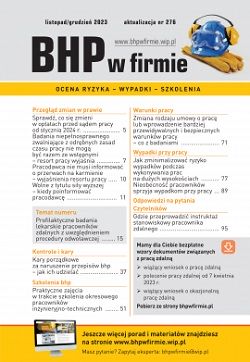
- Topic of the issue: Preventive medical examinations of remote workers, including the appeals procedure
The employer has no right to allow the employee to work without a valid certificate stating that there are no contraindications to work. The above rule also applies to employees working remotely - both permanently and hybridly. Remote workers must therefore be subject to preventive examinations, and the correctness of employers' application of the provisions in this respect may be verified by PIP inspectors.
- Check what will change in labor court fees from January 2024.
From January 1, 2024, the amendment to the Act on court costs in civil cases will come into force. As a result of the change in regulations, all employees, regardless of the value of the case, will be exempt from paying fees for filing a lawsuit in the labor court. Check the details.
- Penalties for violating health and safety regulations – how to impose them
Ensuring compliance with occupational health and safety regulations and principles is a fundamental employee obligation. Otherwise, the employer has the right, and sometimes even the obligation, to apply the procedure of imposing disciplinary penalties. Despite the existence of detailed provisions regulating disciplinary penalties in the Labor Code, employers and employees in the field of occupational health and safety often encounter difficulties in their practical application. Below we present practical tips on imposing fines on employees for violating health and safety regulations.
- Practical classes during periodic training of engineering and technical employees
During periodic training of engineering and technical employees, an important element is conducting practical exercises related to taking into account the requirements regarding occupational health and safety and ergonomic design. Compared to traditional education methods, preparing and conducting such exercises requires a significant amount of work and time. In this article, we will present effective strategies for preparing and implementing practical occupational health and safety and ergonomics classes as part of periodic training for engineering and technical employees. Thanks to our tips, organizers will be able to effectively meet these challenges and ensure that the training brings the expected benefits in terms of improving working conditions and increasing employee awareness of aspects related to safety and ergonomics.
- Changing the type of employment contract or introducing more predictable and safe working conditions - what about tests
In 2023, an amendment to the Labor Code was introduced, which gives employees the opportunity to submit applications once a year to change the terms of the contract with the employer or improve working conditions. Therefore, such modifications may require preventive examinations by occupational medicine units.
- Disabled persons' examinations exempting them from separate working time rules cannot be performed together with preliminary examinations - the Ministry of Labor explains
Disabled people, especially those with a moderate or severe disability, are subject to certain rules regarding working time. However, the occupational medicine doctor has the opportunity to agree to deviate from these rules. It is worth noting that such an examination, in accordance with the interpretation of the National Labor Inspectorate (PIP) and the Ministry of Labor, may be conducted after the commencement of employment, and not as part of preliminary examinations.
- The employer does not have to inform about feeding breaks - explanations from the Ministry of Labor
The new information on employment conditions includes, among other things, a provision regarding breaks at work. However, contrary to our previous assumptions, the Ministry of Labor states that it is not necessary to include breastfeeding breaks at this point. We recommend checking the latest position of the ministry on this matter.
- Time off due to force majeure – when to inform the employer
Since April this year, employees have the opportunity to take advantage of a new form of leave related to force majeure situations. However, if an employee wants to use this option, does he have to inform the employer about the details related to the family incident? What aspects qualify as family matters? Is it possible to submit an application for such an exemption in advance? Recently, the Labor Inspectorate published its position which clarifies these issues.
- How to minimize the risk of accidents when working at high heights
Work at heights is particularly dangerous and is a potential source of serious accidents. Tasks performed using ladders, on scaffolding or working platforms pose a threat both to the employees themselves and to people who are not directly involved in the work process. Falling from a great height often results in serious injuries or even tragic consequences. Therefore, during occupational health and safety training, it is important to discuss the rules related to the organization and conduct of work at heights thoroughly and in accordance with regulations.
- Employee absence increases the risk of accidents at work
The disease season is upon us, which means increased employee absenteeism. It is not uncommon for an employee who is absent to have their tasks delegated to other colleagues, which can lead to an increased pace of work and potentially an increase in the risk of an accident. It is worth remembering that events of a serious, collective or tragic nature are routinely investigated by inspectors of the National Labor Inspectorate.
- Where to conduct on-the-job training for a remote employee
If a company employs an employee on a commission contract (administrative and office position) and the employee will only work remotely at home, where should on-the-job training be conducted?
BHP w firmie (Work safety in the company) - the whole list







